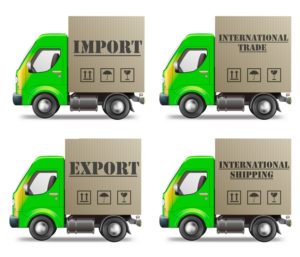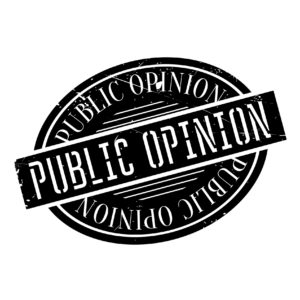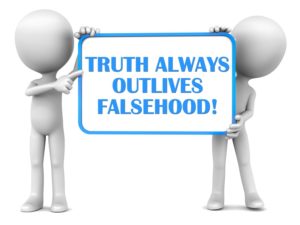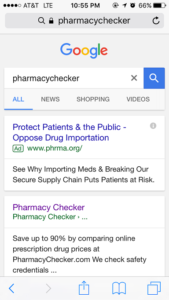by Gabriel Levitt, President, PharmacyChecker.com and Prescription Justice | Aug 11, 2017 | FDA, Policy

Mostly.
Let’s get into semantics. The word “ensure” is defined as to secure or guarantee, to make sure or certain, or to make secure or safe, as from harm. I submit that the FDA cannot ensure the safety of Canadian OR U.S. drugs, but that doesn’t mean they are not safe and effective…
Pharmaceutical Regulation in Canada
The precise communications of the U.S. Food and Drug Administration have changed over the years on why it’s illegal for Americans to buy medications from Canada by personally importing them. Often the implication is that the agency cannot “ensure” or “guarantee” the safety of medications sold in Canadian pharmacies – and that’s why it’s illegal. Additionally, another reason used by the FDA is that the drugs sold in Canada may not be approved by the FDA. These are not good arguments against buying lower cost medications from Canada because the Therapeutic Products Directorate of Health Canada, the FDA’s counterpart, is responsible for regulating the prescription drugs sold in Canadian pharmacies. Like the U.S., Canada has very strict rules to help ensure drug safety.
Neither country can guarantee the safety, efficacy and quality of medications in the two countries. However, their regulatory mechanisms have proven more than adequate, if not superior, so that patients buying medications will almost always obtain a properly manufactured medication. (more…)
Tagged with: ensure, health canada, regulation
by Gabriel Levitt, President, PharmacyChecker.com and Prescription Justice | Aug 4, 2017 | Drug Importation

American medications are usually imported. Now you know.
Yesterday, PharmacyChecker released the findings of our new research that shows 70% of brand name medications sold in U.S. pharmacies are not made in America. Those same medications can be purchased at 70% less in Canada – and even less in other countries. As I’ve written before, there’s a troubling aspect of the public policy debate about drug importation: in many news stories, both policy-oriented and those dedicated to consumers, it seems as if drug importation is currently illegal, which is simply not true. Our data indicates that when Americans walk into their local Walgreens or CVS to fill a prescription, the pharmacist will mostly likely dispense an imported drug – that’s if the patient can actually afford it: 45 million did not fill their prescription last year because of cost.
Our findings come in the wake of an announcement from the Congressional Budget Office about The Affordable and Safe Prescription Drug Importation Act of 2017 (S.469), which aims to make it expressly legal to import lower-cost medications from Canada. CBO’s report shows that if S.469 becomes law, it would shave almost $7 billion off the deficit by 2027. We believe the savings would be much greater. The CBO report reflected deficit savings, but did not include the savings that individuals would also realize from buying lower cost medications from Canada. (more…)
Tagged with: affordable and safe prescription drug importation act, CBO, foreign made, pharmacychecker research, S.469
by Gabriel Levitt, President, PharmacyChecker.com and Prescription Justice | Jul 31, 2017 | Advocacy, Personal Drug Importation
 Both opioid abuse and the high price of medication have wreaked hell on Americans and their families, and now two very different bills in Congress that affect drug importation aim to alleviate these crises. However, if the pharmaceutical industry has its way, the bill meant to address the opioid problem will worsen the catastrophe of inflated drug prices in the United States by threatening American access to lower cost medication imported from Canada and other countries.
Both opioid abuse and the high price of medication have wreaked hell on Americans and their families, and now two very different bills in Congress that affect drug importation aim to alleviate these crises. However, if the pharmaceutical industry has its way, the bill meant to address the opioid problem will worsen the catastrophe of inflated drug prices in the United States by threatening American access to lower cost medication imported from Canada and other countries.
While the high cost of prescription medication is often attributed to the greed of pharmaceutical companies, fewer people are aware that that same avarice aided in causing the epidemic of opioid abuse. Decades ago, drug companies successfully pushed for looser prescribing rules for opioids, which encouraged providers to overprescribe them to their patients.
According to the Centers for Disease Control and Prevention (CDC), 33,091 Americans died in 2015 from overdosing on opioid drugs, but high drug prices can kill, too. Approximately 45 million Americans did not fill a prescription last year due to soaring costs of medication. When people fail to take prescribed medication it frequently leads to illness and too often, worse, death. The CDC estimates that 125,000 people die each year because they are not taking the necessary medications for chronic conditions.
Introduced by Rob Portman (R-Penn.), the Synthetics Trafficking and Overdose Prevention Act (known as the STOP Act) seeks to curb illegal importation, mostly coming from China, of a synthetic opioid drug called fentanyl, which is 50-100 times stronger than methadone.
In 2015, the CDC reported synthetic opioid overdose as the cause of death of 9,580 people, a 72.8 percent increase from 2014. Many of these cases are tied directly to fentanyl. Granted, some deaths can be attributed to lawfully manufactured fentanyl, but the CDC believes that illicitly manufactured fentanyl, which is also used to make counterfeit prescription narcotics including imitation Vicodin and Oxycontin, is the real culprit.
The STOP Act’s language targets the United States Postal Service, through which the fentanyl is coming in, and this is at the heart of the problem.
Under current law, commercial carriers, such as Federal Express and UPS, must provide U.S. Customs and Border Protection, the agency responsible for policing imported goods, advance electronic data about incoming deliveries. That data makes it easier to stop illegal imports, which include illegal fentanyl from China, but also safe prescription medication from Canada.
The USPS does not receive advance electronic data at its international mail centers as uniformly as private carriers, which means fentanyl can be delivered by the USPS. The STOP Act would force USPS to demand advance electronic data from foreign postal services, like Canada Post, and operate similarly to private carriers – making it potentially much easier to stop the fentanyl imports. The twist is that safe and more affordable medication purchased by Americans can also be stopped this way. The bill should be amended to prevent that.
While the scourge of illegal opioid importation is something we should stop, importation of affordable, non-narcotic prescription medication is a lifeline for millions of families. Despite federal restrictions, about 19 million Americans have imported medication for personal use due to high prescription drug prices in the U.S. The practice is prohibited under most circumstances, but individuals are not prosecuted.
The Affordable and Safe Prescription Drug Importation Act, introduced by Senator Bernie Sanders (I-Vt.), would make importation of lower cost medications from Canada, and eventually other countries, lawful. According to a survey by the Kaiser Family Foundation, seventy-two percent of Americans want the law changed.
The bill would also prohibit importation of controlled drugs, such as prescription narcotics, whether lawfully manufactured or fake. Earlier this month, a coalition of non-profit organizations signed on to a letter to Congress supporting the importation bill and those Americans who currently need to import lower cost medication.
Killing the Sanders importation bill, a goal of the pharmaceutical industry, is just the latest chapter in its long campaign to scare people and politicians about importation. A key strategy is to conflate importation of real medicine with that of counterfeit drugs and narcotics, as well as safe international online pharmacies with rogue ones.
Organizations funded by drug companies are promoting the STOP Act, noting it will protect people from not just fentanyl, but counterfeit drugs online. They are conspicuously silent (but they know) that the proposed rules could also curtail imports of genuine medication ordered online from other countries.
There are rogue online pharmacies that are dangerous and sell counterfeit drugs, but they can be avoided with public education and targeting by regulatory and law enforcement actions. For those who buy from properly verified international online pharmacies, personal importation can be equally as safe as walking in your local pharmacy. The safest international online pharmacies all require valid prescriptions, do not sell controlled medications, and do not sell opioids. Their prescription drug prices are often 70 percent lower than in the U.S., and this access to affordable medication is something that should not face roadblocks by the USPS.
Although pharmaceutical companies did not cause illegal importation of dangerous synthetic opioids, their efforts to promote loose prescribing of narcotics fanned those flames. Clearly, skyrocketing medication prices at home have led Americans to illegally obtain lower cost medications from international pharmacies.
We must not restrict imports of safe and affordable medication in an effort to stop illegal opioid trafficking. Allowing the STOP Act to become law in its current form, while a gift to Big Pharma, could prevent many Americans from getting the medication they need.
Gabriel Levitt is president of PharmacyChecker.com, a company which verifies online pharmacies and lists drug price comparisons, and founder of Prescription Justice, a non-profit organization dedicated to ending the crisis of high drug prices in America. Financial disclosure: PharmacyChecker derives revenues from its Pharmacy Verification and Listing Programs.
________________________________________________________________________________________
This op-ed originally appeared in The Hill on June 23rd, 2017.
by Gabriel Levitt, President, PharmacyChecker.com and Prescription Justice | Jul 28, 2017 | Big Pharma

Voters want importation to be legal.
Shocking. Contrary to the outcry against high drug prices in the United States and the findings of the Kaiser Family Foundation, a recent survey conducted by the Alliance for Safe Online Pharmacies (ASOP or “Buy Safe Rx”), the Pharma-funded nonprofit, found that a majority of consumers (59%) oppose legalizing drug importation “after being provided with information specifically pertaining to Canadian online pharmacies.” Information, huh? First, let’s talk about an objective survey on the issue.
In May of this year, the Kaiser Family Foundation issued a more comprehensive, larger survey that found the complete opposite result of ASOP: 72% of respondents support legalizing drug importation from Canada, with Democrats and Republicans agreeing on this issue.
Also, despite the federal prohibitions, nineteen million Americans say they have imported lower cost medication from other countries.
The ASOP “survey” respondents were provided fear-inducing “statistics” surrounding Canadian online pharmacies before asking the survey questions. One such “factoid” gives you a window into the scheming nature of the whole project: (more…)
Tagged with: Alliance for Safe Online Pharmacies, ASOP, Big Pharma, Kaiser Family Foundation, survey
by Gabriel Levitt, President, PharmacyChecker.com and Prescription Justice | Jul 20, 2017 | Advocacy, Drug Safety, Personal Drug Importation, Policy

Getting the truth about Online Pharmacies
The economist and drug safety expert Roger Bate, PhD, affiliated with the American Enterprise Institute, published a short article this week, the title of which says it all: “Credentialed online pharmacies are so safe that peer review literature is no longer interested in results showing it.” The gist is that he and colleagues have been testing medications for several years, since 2008, as mystery shoppers ordering online domestically here in the U.S. and internationally for import. The research shreds the myths of the drug companies by presenting peer-reviewed data to derive what are called “facts” about the Internet and importation. The main fact proved is that importing medications, ones ordered online, can be equally safe as U.S. pharmacies.
In the studies from 2008-2016, 822 online medication orders were tested: 275 medications from 22 international online pharmacies verified by PharmacyChecker.com (12 of which are also verified by the Canadian International Pharmacy Association); 127 medications from eight U.S.-only online pharmacies verified by the National Association of Boards of Pharmacy and/or LegitScript.com, and the rest from websites with no verification.
Verified U.S. pharmacies sold zero counterfeits but one (out of 127) order of generic Cipro was substandard. Verified international pharmacies sold zero counterfeits but one (out of 275) order of generic Cipro was substandard. On a percentage basis, the PharmacyChecker.com-verified websites performed best (but that’s nitpicking). And for those of you thinking, well, one was substandard…that same medication is available at your local Walgreens or CVS. Read the research.
In contrast, online pharmacies with no verification (Dr. Bate calls it “credentialing”) sold eight counterfeits and 16 substandard drugs (out of 332 tested).
How about prices? When it came to brand name drug prices, the studies showed that credentialed international pharmacies were about 60% cheaper. (more…)
Tagged with: AEI, legatum institute, Roger Bate, searle freedom trust
by Gabriel Levitt, President, PharmacyChecker.com and Prescription Justice | Jul 14, 2017 | Politics and policy
 This week I’m down in Washington, DC, talking to policy-makers and activists, setting off alarm bells about Big Pharma’s campaign to not only kill prescription importation legislation but also the ability for Americans to currently buy medications from Canada and elsewhere at all. I have a feeling Big Pharma knows I’m here, which is kind of cool (but also freaks me out because they are very powerful and we are not). Here’s the very quick story.
This week I’m down in Washington, DC, talking to policy-makers and activists, setting off alarm bells about Big Pharma’s campaign to not only kill prescription importation legislation but also the ability for Americans to currently buy medications from Canada and elsewhere at all. I have a feeling Big Pharma knows I’m here, which is kind of cool (but also freaks me out because they are very powerful and we are not). Here’s the very quick story.
When I searched “pharmacychecker” in Google I noticed the top advertisement was placed by none other than the Pharmaceutical Researchers and Manufacturers of America (“Big Pharma”). That ad doesn’t show up in Brooklyn where I live but appears targeted in Google to the DC area. They know that our pricing information, verification work we do for patient safety, and advocacy is compelling to some public policy and healthcare advocates down here, so they pay Google to get their message on top. As if Big Pharma’s 1100 lobbyists aren’t enough!
It’s a badge of honor (but there’s no sleep til Brooklyn).
Tagged with: Brooklyn, DC, phrma








